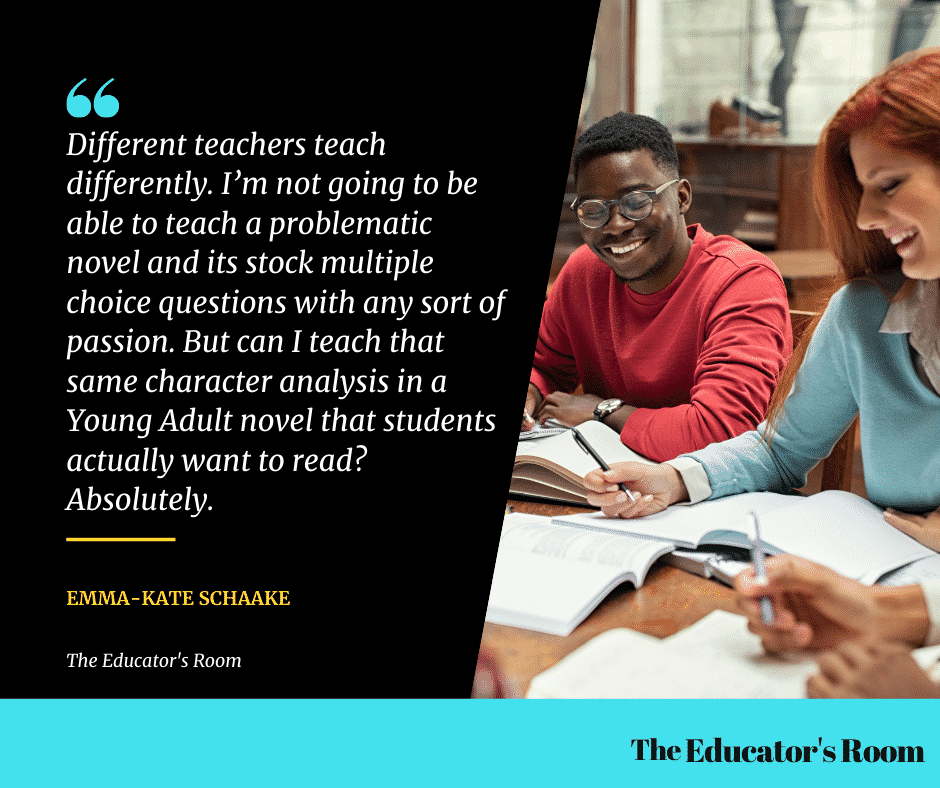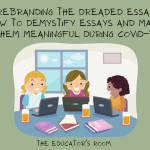Fire the Canon: Curriculum is the Vehicle, Not the Destination
It feels like every year around this time, the English department has a serious discussion about the curriculum. We start with valid PLC questions about key skills and standards at each grade level, but quickly devolve into how we taught specific canonical books and the district purchased textbooks with fidelity.
In my mind, and if I trust my colleagues as I do, the only conversation we really need to have is the former. What did our students learn about reading, writing, language, and humanity? Yet, talking about expository writing with clear supporting evidence always turns into “okay, but did everyone read To Kill a Mockingbird?”
Where We Stand
It seems my colleagues and I fall into three distinct camps.
The Canon: This ideology is usually reserved for Honors and AP teachers. Essentially, there are certain books that have always been taught and should persist because of their cultural capital. These texts create a shared understanding of literature that students need for the AP exams or college literature courses.
I don’t teach these advanced courses, so I can’t speak to the validity of the AP curriculum and exams. But, I wonder how and why these texts continue to be understood as definitive. When To Kill A Mockingbird, with it’s racist language and problematic white saviorism is still essential reading, it seems the white supremacist roots and branches of education are to blame.
As professor Bree Picower, Ph.D. writes in her book, Reading, Writing, and Racism, “Given that the vast majority of teachers are White and may not have had the opportunity to examine their Whiteness, many of them are moving passively on the conveyor belt…While only some may be actively contributing to #CurriculumSoWhite, many are doing nothing to interrupt it.”
White teachers teach the books they’ve always taught. These are the same ones they read when they were in school, or even what their parents read because that’s still what’s on exams. They might not be to blame for the whole system, but they are passively on that conveyor belt, feeding into a system that supports a very narrow view of education and “cultural capital;” very white and very male in the subject matter if not authorship.
The Textbook: In this camp is the realization that our district spends an exorbitant amount of money on textbooks. Our is of the Pearson variety; a consumable textbook that, conveniently, needs to be replaced every year.
The books have some fine selections (as in, not all white male authors) but if this was truly taught “with fidelity,” teachers would have no choice in what or how they teach. The textbook is a full, step-by-step curriculum complete with a calendar, activities, and prompts that have always reminded me of some sort of “welcome to teaching” binder given to first-year teachers instead of instructional coaching.
Some of my colleagues insist we need to use this curriculum for moral reasons. Tax dollars directly paid for it, after all. But, I can find a whole lot of great lesson materials for free, or next to nothing comparatively. So, why aren’t we instead of using those tax dollars to support teachers in doing what’s best for kids? Hmm, is it because we don’t trust teachers?
The Maverick: If it’s not clear by now, this is definitely where I fall, and sometimes in those department meetings, it feels like I am entirely alone. I absolutely love sourcing creative ideas from my graduate studies, online, or from what’s going on in the world. I read socially conscious young adult literature and am passionate about sharing it with my students.
The Canoners want all freshmen to have read Of Mice and Men so that when they are juniors, they all have a touchstone text and shared understanding to refer back to. In theory, sure. But, do we really think we are going to have a deep thematic discussion about the connection between Of Mice and Men and The Grapes of Wrath without some serious backfill? I’m pretty sure the only thing students remember about Of Mice and Men is Lenny’s death. (Oh, rabbits too, probably something about rabbits.)
The Textbookers, especially at the district level, argue for equitable instruction across classrooms and schools. Great, but, we should know by now that equitable doesn’t mean equal.
Different teachers teach differently. I’m not going to be able to teach a problematic novel and its stock multiple-choice questions with any sort of passion. But can I teach that same character analysis in a YA novel that students actually want to read? Absolutely.
Different students learn differently. I have yet to see a 14-year-old with severe ADHD become enthralled by a 300-page classic. But, this fall, several students read Dear Martin cover to cover in a day.
So, What Should We Teach?
In high school, I was a model English student. I read and wrote under the table during math class and went on to major in English. I love to read and I appreciate the beauty in books ranging from deeply literary to light and humorous.
But, even I used Spark Notes. There were a few books that appeal to me for whatever reason and because I knew how to “do school,” I could easily skim around and find a few synopses to keep up my easy A.
I’m not saying every teacher should just teach whatever they want, no questions asked. We have standards and collaboration with our colleagues for a reason.
But, what I want everyone to understand is the reality that there are infinite ways to get students to meet our standards. Specific books shouldn’t matter.
[bctt tweet=”Mandated curriculum shouldn’t dictate our classrooms. ” username=””]
English classes should be intellectually stimulating and provide students with the tools to learn and grow. Maybe even authentically spark an interest in reading and writing. Go figure.
No one remembers what they learned in high school. But, they remember how. They won’t remember the symbolism of the ducks in chapter two of Catcher in the Rye, but they will remember the moment they realized they wrote something they could be proud of.
Curriculum is the vehicle, not the destination. And, I’d rather my students enjoy the journey than Spark Note the “answers.”






